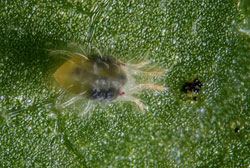Several species of mites and scale insects infest indoor plants, damaging or killing them.
One such pest, the two-spotted spider mite, is very small and difficult to see with the naked eye. They are usually found on lower leaves. Stippling on leaves or spider webs are signs of damaged plants. Spider mites, which develop from an egg to an adult within about two weeks, attack a variety of indoor plants.
webs are signs of damaged plants. Spider mites, which develop from an egg to an adult within about two weeks, attack a variety of indoor plants.
Scale insects are usually brought into the home on infested plants. A common scale insect is the soft brown scale that sucks sap from plants. Scale insects excrete honeydew, which is a characteristic sign of scale damage. Female scale insects lay up to 1,000 eggs that hatch into tiny, crawler scale insects and spread throughout the plant. Crawlers eventually settle into one location where they feed for the rest of their lives.
Biological control can sometimes be effective against spider mites. A predatory mite, that develops twice as fast as the pest has been an effective control for the two-spotted spider mite. Various insecticides and miticides control two-spotted spider mites and scale insects. It may be necessary to repeat insecticide applications to control mites. Consult the pesticide label for registered plants to see if the pesticide is approved for use on your plant. Also, check the label for application rates to prevent plant damage and protect yourself.
Check plants before you purchase them to prevent introduction of insect pests into your home. If the insect pest problem is missed before a plant is purchased, early detection and diagnosis of insect pests before they are established is a key management tool that can prevent major infestations.
For more information, see the following Colorado State University Extension fact sheet(s).



